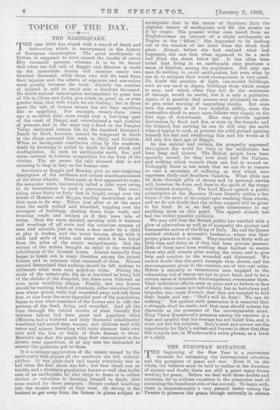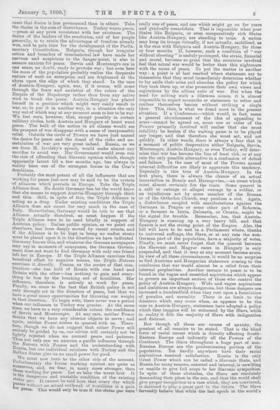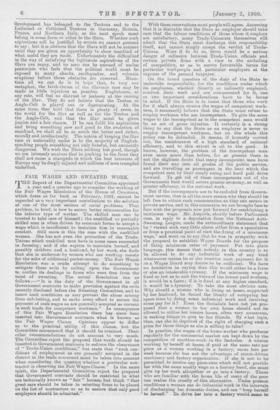THE EUROPEAN SITUATION. T HE beginning of the New Year is
a convenient moment for estimating the international situation and the prospects of peace and war. Even if, on the whole, the balance must be held to incline in the direction of anxiety and doubt, there are still a great many forces working 'for peace. Before we deal with these doubts and anxieties, let us address ourselves to the pleasanter task of examining the beneficent side of the account. To begin with, there is unquestionably a very general desire among the Powers to preserve the peace, though naturally in certain cases that desire is less pronounced than in others. Take the States in the area of disturbance. Turkey wants peace, —peace at any price consistent with her existence. The desire of the leaders of the revolution, and of her people generally, is to retain the advantages of freedom already won, and to gain time for the development of the Parlia- mentary Constitution. Bulgaria, though her irregular action and breaches of international law have made her nervous and suspicious to the danger-point, is also in essence anxious for peace. Servia and Montenegro are in one sense, no doubt, ready to provoke war ; but even here the mass of the population probably realise the desperate nature of such an enterprise, and are frightened at the abyss upon the edge of which they stand. In the case of Austria-Hungary, again, war, if it comes, will come through the fears and anxieties of the rulers of the Empire of the Hapsburgs rather than from any active wish to break the peace. Austria-Hungary has placed herself in a position- which might very easily result in war, or, to put it in another way, in a situation the only way out of which may at any moment seem to her to be war. We feel sure, however, that, except possibly in certain military circles, both Austria and Hungary at heart want peace. The bulk of the nation in all classes would see the prospect of war disappear with a sense of inexpressible relief. Outside the circle of Powers we have just named the desire for peace and the dread of the risks and un- certainties of war are very great indeed. Russia, as we see from M. Isvolsky's speech, would make almost any sacrifice to avoid war. Her Government would even run the risk of offending that Slavonic opinion which, though apparently latent till a few months ago, has always in reality been one of the strongest forces in the Czar's dominions.
Probably the most potent of all the influences that are working for peace just now may be said to be the system of alliances which prevails in Europe. Take the Triple Alliance first. No doubt Germany has let the world know that she means to support Austria-Hungary through thick and thin. Still, in spite of this, the Triple Alliance is acting as a drag. Under existing conditions the Triple Alliance does not count for very much in the case of Italy. Nevertheless, Germany would be loth to see that Alliance actually dissolved, as must happen if the Triple Alliance were to be used blindly in support of Austrian policy. Italian public opinion, as we point out elsewhere, has been deeply moved by recent events, and if the Alliance is to be kept in being no undue strain must be placed upon it in the direction we have indicated Germany knows this, and whatever the German newspapers may say in moments of annoyance, the German Govern- ment does not want to find Germany with only one friend left her in Europe. If the Triple Alliance exercises this beneficial effeet by negative means, the Triple Entente exercises it directly. France, as the centre of that com- bination—she has hold of Russia with one hand and Britain with the other—has nothing to gain and every- thing to lose by the breaking out of hostilities. Her influence, therefore, is actively at work for peace. Finally, we come to the fact that British policy is not only strongly set in the direction of peace, but that we have a great many opportunities for throwing our weight in that direction. To begin with, there never was a period when our influence in Turkey was greater. At the same time, we have to a very considerable extent the confidence of Sarnia and Montenegro. At any rate, neither Power thinks that we have any ulterior objects to serve ; and again, neither Power wishes to quarrel with us. There- fore, though we do not suggest that either Power will entirely be guided by us, our advice will certainly not be lightly rejected when we counsel peace and patience. Thus not only can we exercise a pacific influence through the Entente with France and the understanding with Russia., but our individual relations with Turkey and the Balkan States give us no small power for good. We must now turn to the other side of the account. Unfortunately the forces working against are quite as numerous, mid, we fear, in many cases stronger, than t.hose working for peace. Let us take the worst first. It Is the dangerous and unstable condition of the existing 4°118 guo. It cannot be said here that every day which rories without an actual outbreak of hostilities is a gain Poe. This would only be true if the status quo were really one of peace, and one which might go on for years and gradually consolidate. That is impossible when poor States like Bulgaria, or even comparatively rich States like Austria-Hungary, are standing to arms. A nation may keep its troops virtually, if not actually, mobilised, as is the case with Bulgaria and Austria-Hungary, for three or four months. If, however, such a condition of "war without shooting" is unduly prolonged, the strain, financial and moral, becomes so great that the countries involved feel that actual war would be better than this nightmare with the name of peace. To put the matter in another way : a point is at last reached where statesmen say to themselves that they must immediately determine whether to lay aside their arms and abandon the policy for which they took them up, or else prosecute their own views and.
aspirations by the ultimo, ratio of war. But when the need for solving such a dilemma comes, it is almost impossible to expect monarchs or statesmen to retire and confess themselves beaten without striking a single blow. This, then, is what we dread most in the present situation. If a Conference—which would, in fact, mean a general abandonment of the idea of appealing to arms—cannot be agreed on, some one or other of the Powers primarily involved will realise that she must infallibly be beaten if the waiting game is to be played any longer, and that therefore she must act, and act quickly. In other words, there is always a fear that in a moment of politic desperation either Bulgaria, Servia, Montenegro, Austria-Hungary, or even Turkey, will deter- mine that war has become the line of least risk, or at any rate the only possible alternative to a confession of defeat and failure. In the case of most of the Powers named internal difficulties are likely to aggravate this tendency. Especially is this true of Austria-Hungary. In the first place, there is always the chance of an actual insurrection in Bosnia and Herzegovina,—an event which must almost certainly fire the train. Some quarrel in a cafe or outrage or alleged outrage by a soldier, or an injudicious act by some member of the Roman or of the Orthodox Church, may produce a riot. Again, a disturbance coupled with manifestations against the Germans in Prague or some other part of Bohemia, or a ferment in Istria, Dalmatia, or Croatia, might be the signal for trouble. Remember, too, that Austria- Hungary is running up a very heavy bill, and that finance is not the strong point of the Empire. Also, the bill will have to be met in a Parliament where, thanks to universal suffrage, the Slays, or at any rate the non- German part of the population, have a majority of votes. Finally, we must never forget that the quarrel between the Slavonic and Magyar races in Hungary is only suspended, and that it may at any moment become acute. In view of all these circumstances, it would be no surprise to find Austrian and Hungarian statesmen coming to the conclusion that war would almost be a relief from their internal perplexities. Another menace to peace is to be found in the vague and unsettled aspirations which appear to govern an important section of those who control the policy of Austria-Hungary. Wide and vague aspirations and ambitions are always dangerous, but those dangers are increased a hundredfold when they rest upon a foundation of paradox and unreality. There is no limit to the disasters which may come when, as appears to be the case in Austria-Hungary, statesmen have adopted a policy which they imagine will be welcomed by the Slays, while in reality it Alla the majority of Slays with indignation and distrust.
But though all these are causes of anxiety, the greatest of all remains to be stated. That is the blind force of racial unrest which is directly affecting South- Eastern Europe and indirectly all the Powers of the Continent. The Slays throughout a huge part of non- Russian Europe are the predominating portion of the population. Yet hardly anywhere have their racial aspirations received satisfaction. Russia is the only Great Power which can be called a Slavonic State, and Russia for many reasons, external and internal, is unwilling or unable to give full scope to her Slavonic sympathies. In spite of these obstacles, the Slays are resolutely demanding their place in the sun, and that the world shall give proper recognition to a race which, they are convinced, is destined to play a great part in the future. The Slays fervently believe that while the last epoch in the world's 'development has belonged to the Teutons and to the Latiuised or Celticised Teutons in Germany, Britain, France, and Northern Italy, so the next epoch must belong in sonic form or other to the Slays. Whether such aspirations will be justified by events we cannot pretend to say ; but it is obvious that the Slays will not be content until they are given an opportunity to show mankind of what metal they are made. Unfortunately the difficultied in the way of satisfying the legitimate aspirations of the Slays are :ninny, and no man can be accused of undue pessimism who feels that the political world must be exposed to many shocks, earthquakes, and volcanic eruptions before those obstacles aro removed. Mean- time all we can do is to hope that, to vary our metaphor, the birth-throes et the Slavonic race may be made as little injurious as possible. Englishmen, at auy rate, will feel no distrust or jealousy at the coining of the Slay. They do not believe that the Teutou or Anglo-Celt is played out or degenerating. At the same time, they hold that there is plenty of room in the world for the Slav as well as for the Teuton and the Anglo-Celt, and that the Slav must be given justice aud a fair chance. If he cau fulfil his aspirations and bring something new and good to the evolution of mankind, we shall all be so much the better and richer, morally and intellectually. The notion of keeping the Slav race or nationality under is to the majority of English- speaking people something not only hateful, but eminently dangerous. We wish the Slays nothing but good, though we are intensely anxious that in pushing to the front they shall not cause a stampede in which the best interests of Europe may be deeply injured and millions of men trampled underfoot.














































 Previous page
Previous page